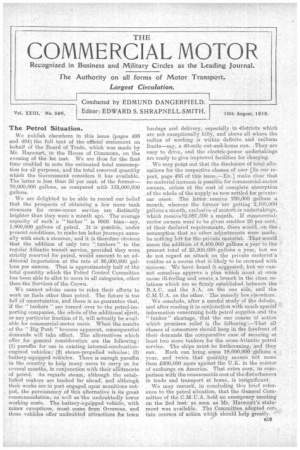The Petrol Situation.
Page 1

If you've noticed an error in this article please click here to report it so we can fix it.
We publish elsewhere in this issue (pages 493 and 494) the full text of the official statement on behalf of the Board of Trade, which was made by Mr. Harcourt, in the House of Commons, on the evening of the 1st inst. We are thus for the first time-enabled to note the estimated total consumption for all purposes, and the total reserved quantity which the Government considers it has available. The latter is less than 60 per cent. of the former70,000,000 gallons, as compared with 153,000,000 gallons. • .
We are delighted to be able to record our belief that the prcispects of obtaining .a few More tank steamers for cross-ocean service are distinctly brighter than tho werea menth agO. The aVerage capacity of such '.a "tanker'' is 6000 tons—say, 1,800,000 .gallons of petrol. It is •poSsible, under present Conditions, to make ten laden journeys annually With such. a steamer; and it iS -therefore obvious that the addition of only two ":tankers to the regular Atlantic transit service, provided they were strictly reserved for petrol, would amount to an additional importation at the rate of 36,000,000 gallons per annum. .That is approximately half of thetotal quantity which the Petrol Control Committee has been able to allot to users in all categories, other than the Services of the Crown. • We cannot advise users to relax their efforts to work on fuels other than -petrel. The future, is too full of uncertainties, and there is no guarantee that, if the " tankers " are turned over to the petrol-importing companies, the whole orthe additional sPirit, or any particular fraction of it, will actually be available for commercial-motor users. When the results of the " Big Push " become apparent, consequential demands will take effect. The alternatives which. offer-. for general consideration are the following: (1) para.ffin for usein existing internal-combustion= engined vehicles ; (2) steam-propelled vehicles ; (3) battery-equipped vehicles. There is enough paraffin. in the country to help many users to carry on for several months, in conjunction with their allotments. of petrol. As regards' .steam, although the estab-: lished makers are booked far ahead, and although their works are in part engaged upon munitions output; the permanency of this alternative is its great recommendation, as well as the undoubtedly lower working costs. The battery:equipped vehicle, With minor exceptions, must come from. Overseas, and these vehicles offer undoubted attractions fb tOWn haulage and delivery; especiallyin districts which .are not exceptionally hilly, and above all where the radius of working is within definite and uniform limits—say, a 40-mile out-and-home run. They are easy to drive, and the electric-power undertakings are ready to give improved facilities for charging..
We We may. point out that the disclosure of total. allocations for the respective classes Of user [In our report', page 495 of this issue.—En.] make clear. that no material increase is possible for commercial-motor owners, tinle& at the cost of complete absorption of the whole of the supply as now settled for privatecar userS: They latter. -receive 700,000 gallons a Month, whereasthe former are .getting. 2,100,000 gallohs'a Month, exclusive. of Motorb as Undertakings, which .receiV02,087,500 a month. If commercial-, motor owners were to be given another 20 per cent. of their deClared.requiremonts, there would, on the assumption that no other adjustments were made, be nothing-Ieft•for the priate motorist, That would mean the addition of 8,400,00 gallons a year-to:the present total of 25,200,000. gallons a year, but we do not regard an, attack on the private motorist's r3sidue as a course that is likely to be crowned with suCcess. We -have heard it suggested, but we cannot ourselves approve a plan which must at once cause ill-feeling and, create,a breach in the close relations which are se firmly. established .between the RIA.C. and the A.A. on the one side, and the C.M.U.A. on the other .• The remedy lies eliewhere.
• We conclude, after a careful litudy of the debate, and after reading it in conjunction With much special information concerning both petrol supplies and the ." tanker" shortage, that the one course of action which promises relief is the following :—That all classes of consumers should keep in the forefront of their demands the comparative ease of securing at least. two more tankers for the cross-Atlantic petrol sekice. The ships .must, he forthcoming, and they can, Each can bring seme 18-,000,000 gallons ai Year, and twice that quantity means not more than k300,000 more against the U.N. in the matter of exchange on America.. That extra sum, in .001117 parison -With the unassessable cost of the disturbances in trade and transport at home, is insignificant.
. We may remark, in Concluding this brief reference to the petrol situation, that the General Cornmittee.of the C.M.I.T.A. held an emergency Meeting on the 2nd inst. as soon as "Mr. Harcourt' sstatement was available. The Committee adopted cer= tainI .co.nrses of -aetion which should help greatly.






















